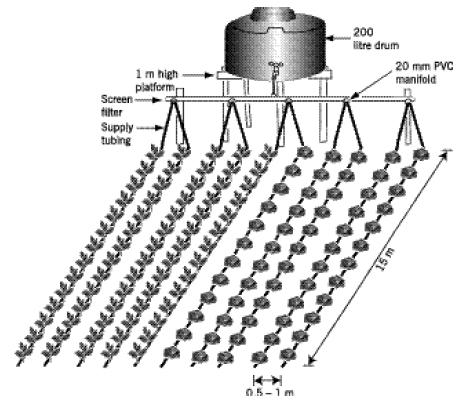Difference between revisions of "KARI"
From Akvopedia
| Line 1: | Line 1: | ||
[[Image:Kari drum icon.png|right|100px|]] | [[Image:Kari drum icon.png|right|100px|]] | ||
[[Image:KARI drum.jpg|thumb|right|300px|Layout of a drum system adapted from Chapin’s bucket kit. Drawing: [http://www.samsamwater.com/library.php?serie=RELMA%20Technical%20Handbook%20Series RELMA.]]] | [[Image:KARI drum.jpg|thumb|right|300px|Layout of a drum system adapted from Chapin’s bucket kit. Drawing: [http://www.samsamwater.com/library.php?serie=RELMA%20Technical%20Handbook%20Series RELMA.]]] | ||
| − | + | __NOTOC__ | |
This is a variation of the [[Chapin]] bucket kit and involves using a drum of about 200-litre capacity or the equivalent of five bucket drip irrigation systems. The development of this adaptation is credited to a farmer in Eldoret in the Rift Valley Province of Kenya who, after working with the bucket drip kits, connected an old drum to supply four drip lines. KARI improved on the drum adaptation by designing the | This is a variation of the [[Chapin]] bucket kit and involves using a drum of about 200-litre capacity or the equivalent of five bucket drip irrigation systems. The development of this adaptation is credited to a farmer in Eldoret in the Rift Valley Province of Kenya who, after working with the bucket drip kits, connected an old drum to supply four drip lines. KARI improved on the drum adaptation by designing the | ||
manifold with 4 or 5 openings each serving two drip lines. | manifold with 4 or 5 openings each serving two drip lines. | ||
Revision as of 03:46, 13 December 2012

Layout of a drum system adapted from Chapin’s bucket kit. Drawing: RELMA.
This is a variation of the Chapin bucket kit and involves using a drum of about 200-litre capacity or the equivalent of five bucket drip irrigation systems. The development of this adaptation is credited to a farmer in Eldoret in the Rift Valley Province of Kenya who, after working with the bucket drip kits, connected an old drum to supply four drip lines. KARI improved on the drum adaptation by designing the manifold with 4 or 5 openings each serving two drip lines.
Construction, operations and maintenance
System components
- 200-litre drum with opening at one end or cut open ∫” gate valve (control valve) ∫” x 6 m plastic water pipe
- 4 x ∫” PVC tees
- 3 x ∫” PVC bends
- 5 filter plugs
- 10 x 0.5 m lengths of flexible tubing
- 10 barb x drip lock fittings
- 10 x 15 m drip irrigation tubes
- 10 drip tube end closures.
Assembly instructions
- Prepare a rectangular area 7.5 wide x 16 m.
- Peg out the position of beds and paths to accommodate 5 beds each 1-m wide x 15-m long. Leave a 20 cm space between the beds.
- Connect the manifold by cutting the pipe into 3 pieces each 1.25 m long. These are connected to the 3 tees and the 2 bends connected at the ends. The 3 tees and 2 bends on each side of the PVC pipe are designed to be centrally located on the five planting beds. Depending on the location of the drum, a tee is connected to channel the water from the drum to the manifold.
- Use PVC glue for leak-proof fitting and wait for the required duration to allow bonding.
- Lay out the drip tapes on the beds, two lines per bed, and insert the filter plugs into the open ends of the outlets in the manifold.
- Finally, connect one end of the connector tubing to the filter plug and insert the barb fitting to the other end. Connect the drip tube to the drip lock fitting.
Costs
To install a drum system costs about KSh7,500 (US$100) in Kenya.
Acknowledgements
- Sijali, Isaya V. DRIP IRRIGATION: Options for smallholder farmers in eastern and southern Africa. RELMA, 2001.
